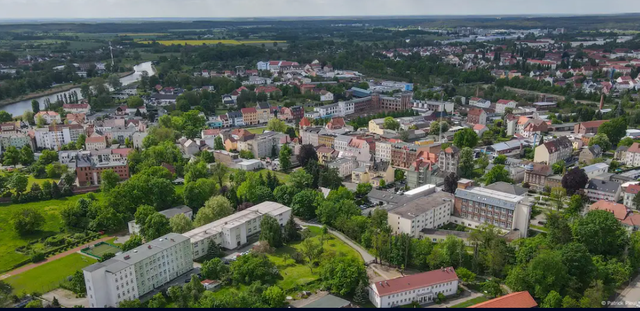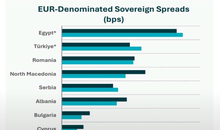
 Flash News
Flash News
Lavrov: NATO is risking self-destruction with new military budget
Kurti and Vučić "face off" tomorrow in Skopje
Construction worker dies after falling from scaffolding in Berat
The prosecution sends two Korça Municipality officials to trial
Violation with the €2.3 million tender, GJKKO imposes security measures on the head of the Public Procurement Commission, he is suspended from duty

"You have no problem finding affordable housing. There are no traffic jams or rush hour. And I've never had trouble finding a parking space," says Anika Franze, smiling from behind her desk in the center of the small town of Guben on Germany's eastern border with Poland.
The 38-year-old was born in East Berlin, formerly the German Democratic Republic, and lived in the same neighborhood for most of her life before and after the fall of the Berlin Wall. But due to the busy pace and housing prices in the capital, she had been thinking about leaving for some time.
During a trip through Brandenburg, she heard on the radio about a "test housing" program in Guben. Interested parties are given the opportunity to live there for up to a month for just 100 euros a week. The goal: to encourage people to settle in the city and thus challenge the growing population decline in eastern Germany.
Applications also from Algeria, Egypt and Brazil
Anika Franze has lived in Guben for eight months, and now runs the project that brought her to the city. She lives in a two-story apartment of 100 square meters, rented for the same price she would pay for a room in a shared apartment in Berlin.
"It's always quiet here, there's no noise, there's less litter on the streets and you always meet people you know," she explains on a short tour of the city. Last year, 30 people took part in the program in Guben, six of whom later moved there permanently. This year, 40 applications have already arrived at Franze's desk: from all over Germany, Belgium, and even from Algeria, Egypt and Brazil.
The population in East Germany has halved in 30 years.
Guben, famous for its textile and hat industries before reunification, is just one of hundreds of industrial towns in East Germany that experienced major demographic changes after German reunification in 1990. Falling birth rates, migration of young people, especially to the western states, and increasing life expectancy have accelerated demographic aging.
"We are missing a whole generation," mayor Fred Mahro told the Berlin newspaper "taz." True, Guben currently has 16,600 inhabitants, while 30 years ago there were almost twice as many. Estimates predict that the population will continue to decline in the coming years, as will the number of people of working age, while the average age, currently 58, will continue to rise.
"From an economic perspective, we need to ensure that locations remain attractive and that incentives are created for companies to locate there, but it's about much more than that, for example, a welcoming culture and social coexistence," Susanne Schultz, a migration policy expert at the Bertelsmann Foundation, told DW.
Not an easy undertaking, as one in four immigrants is considering leaving Germany, according to a recent study by the Institute for Employment Research, IAB. "Dissatisfaction with politics was one of the main reasons and I think that has a lot to do with the recent developments of the past year and a half, the atmosphere in Germany has really changed," says Schultz.
East Germany has an image of a right-wing bastion.
In the fight to attract new residents, Germany's eastern states are mainly struggling with their reputation as a hotbed of right-wing extremism. Guben also made headlines in 1999 when Algerian asylum seeker Farid Guendoul bled to death after being chased by neo-Nazis.
In the federal elections in February 2025, almost 39 percent of residents voted for the Alternative for Germany (AfD), which the Brandenburg Office for the Protection of the Constitution had recently classified as right-wing extremist. "People have their prejudices and clichés, but in my experience, you can still relate to them. They may just need a little time, because they are not used to so much diversity," explains Anika Franze. She is also disappointed that there is so much focus on the AfD, as more than 60 percent of people voted for moderate parties.
For now, Anika Franze enjoys a life that is quieter than in the German capital. Now she has also managed to fulfill a childhood dream: learning to ride a horse. "I don't know if I want to grow old here, but I also don't know if I would do that in Berlin." DW
Latest news


Fuga: Journalism in Albania today in severe crisis
2025-06-30 21:07:11
"There is no room for panic"/ Moore: Serbia does not dare to attack Kosovo!
2025-06-30 20:49:53

Temperatures above 40 degrees, France closes nuclear plants and schools
2025-06-30 20:28:42
Lavrov: NATO is risking self-destruction with new military budget
2025-06-30 20:13:54
Turkey against the "Bektashi state" in Albania: Give up this idea!
2025-06-30 20:03:24

Accused of sexual abuse, producer Diddy awaits court decision
2025-06-30 19:40:44



Kurti and Vučić "face off" tomorrow in Skopje
2025-06-30 18:44:12
Tourism: new season, old problems
2025-06-30 18:27:23


Construction worker dies after falling from scaffolding in Berat
2025-06-30 17:51:44




Almost free housing: East Germany against depopulation
2025-06-30 16:43:06

Hamas says nearly 60 people killed in Gaza as Trump calls for ceasefire
2025-06-30 16:14:15
Drownings on beaches/ Expert Softa: Negligence and incompetence by institutions!
2025-06-30 16:00:03


European ports are overloaded due to Trump tariffs
2025-06-30 15:30:44
The prosecution sends two Korça Municipality officials to trial
2025-06-30 15:19:54

Lezha/ Police impose 3165 administrative measures, handcuff 19 drivers
2025-06-30 14:55:04
Young people leave Albania in search of a more sustainable future
2025-06-30 14:47:52
Record-breaking summer, health threats and preventive measures
2025-06-30 14:36:19


Constitution of the Parliament, Osmani invites political leaders to a meeting
2025-06-30 14:07:54

Heat wave 'invades' Europe, Spain records temperatures up to 46 degrees Celsius
2025-06-30 13:42:02
Accident in Vlora, car hits 2 tourists
2025-06-30 13:32:16

Kurti confirms participation in today's official dinner in Skopje
2025-06-30 13:03:27

Fight between 4 minors in Kosovo, one of them injured with a knife
2025-06-30 12:38:45

Report: Teenage girls the loneliest in the world
2025-06-30 12:20:40
Commissioner Kos and Balkan leaders meet in Skopje on Growth Plan
2025-06-30 12:07:59
Wanted by Italy, member of a criminal organization captured in Fier
2025-06-30 11:55:53
Hundreds of families displaced by wave of Israeli airstrikes in Gaza
2025-06-30 11:45:17

Zenel Beshi: The criminal who even 50 convictions won't move from Britain
2025-06-30 11:23:19
A new variant of Covid will circulate during the summer, here are the symptoms
2025-06-30 11:14:58


"Partizani" case, trial postponed to July 21 at the Special Court
2025-06-30 10:41:05
Uncontrolled desire to steal, what is kleptomania, why is it caused
2025-06-30 10:30:08
Requested change of security measure, hearing for Malltez postponed to July 7
2025-06-30 10:24:32


Output per working hour in Albania 35% lower than the regional average
2025-06-30 09:54:35


The trial for the "Partizani" file begins today
2025-06-30 09:27:57
22 fires in the last 24 hours in the country, 2 still active
2025-06-30 09:21:28
How is the media controlled? The 'Rama' case and government propaganda
2025-06-30 09:13:36
German top diplomat: Putin wants Ukraine to capitulate
2025-06-30 09:00:07
Foreign exchange, how much foreign currencies are sold and bought today
2025-06-30 08:44:38
Chart/ Sovereign risk for Albania from international markets drops significantly
2025-06-30 08:26:38
Horoscope, what do the stars have in store for you?
2025-06-30 08:11:44
Clear weather and passing clouds, here is the forecast for this Monday
2025-06-30 07:59:32
Morning Post/ In 2 lines: What mattered yesterday in Albania
2025-06-30 07:47:37
Milan make official two departures in attack
2025-06-29 21:57:23
6 record tone
2025-06-29 21:30:46
4-year-old girl falls from balcony in Lezha, urgently taken to Trauma
2025-06-29 21:09:58


Assets worth 12 million euros seized from cocaine trafficking organization
2025-06-29 19:39:43
Fire in Durrës, Blushi: The state exists only on paper
2025-06-29 19:17:48

Fire endangers homes in Vlora, helicopter intervention begins
2025-06-29 18:27:51
France implements smoking ban on beaches and parks
2025-06-29 18:02:08
England U-21 beat Germany to become European champions
2025-06-29 17:42:49
Trump criticizes Israeli prosecutors over Netanyahu's corruption trial
2025-06-29 17:08:10
Street market in Durrës engulfed in flames
2025-06-29 16:52:57

UN nuclear chief: Iran could resume uranium enrichment within months
2025-06-29 16:03:24
Albanian man dies after falling from cliff while climbing mountain in Italy
2025-06-29 15:52:01

Another accident with a single-track vehicle in Tirana, a car hits a 17-year-old
2025-06-29 15:07:15
While bathing in the sea, a vacationer in Durrës dies
2025-06-29 14:54:01
Sentenced to life imprisonment, cell phone found in Laert Haxhiu's cell
2025-06-29 14:26:40
77 people detained in protest, Vučić warns of new arrests
2025-06-29 14:07:46

From a hospital for children to a prison for politicians
2025-06-29 13:34:02
77-year-old man found dead in Pogradec
2025-06-29 13:13:10
The Metropolitan of Gjirokastra passes away
2025-06-29 12:52:27
The 39th session to elect the speaker of Kosovo's parliament also fails
2025-06-29 12:31:28
France bans smoking on beaches and parks
2025-06-29 12:16:23
Alarm from the Philippines: Albania, a growing destination for labor trafficking
2025-06-29 11:50:34

